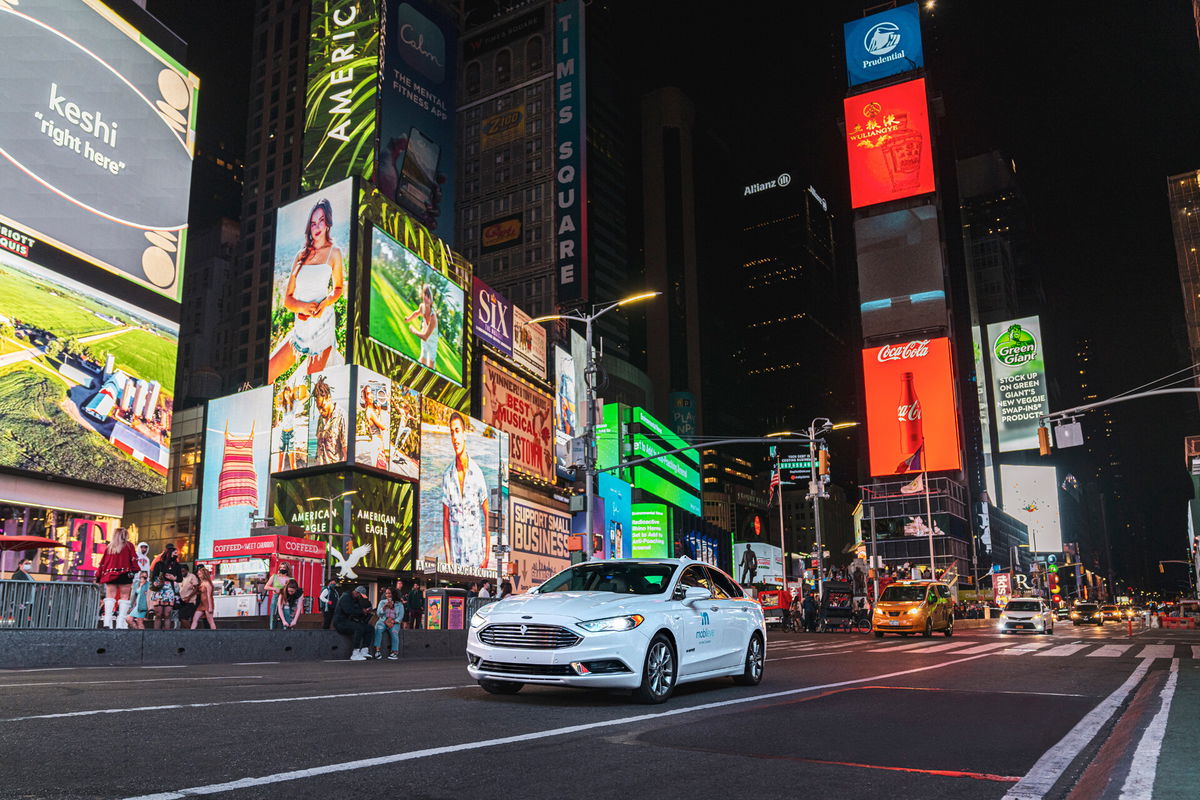See the first self-driving car to take a spin on NYC streets

By Peter Valdes-Dapena, CNN Business
Mobileye, an Israeli self-driving technology company owned by Intel, has become the first company to test fully self-driving cars on New York City’s streets.
While a number of companies test cars in California and Arizona, New York hasn’t generally been used as a test site. New York is home to crowded streets, challenging driving dynamics — aggressive drivers combined with equally rule-averse pedestrians and cyclists — and highly variable weather. Also, the state has a law specifically requiring drivers to keep at least one hand on the steering wheel at all times.
But Mobileye has received a special permit so that the “safety drivers” in its vehicles can keep their hands entirely off the steering wheel. Its test cars can also operate without police escorts, something that has generally been required for any hands-free driving in the city.
GM previously demonstrated its Super Cruise system for journalists in New York City once, but that system operated hands-free only on highways and there were police escorts.
Mobileye received permits for the testing after showing the results of its test drives in other cities, Mobileye CEO Amnon Shashua said. The company has been testing its vehicles in Tel Aviv, Munich, Detroit, Tokyo, and around Shanghai. It expects to soon begin testing in Paris.
Mobileye’s self-driving Ford Fusion sedans have already been driving in Manhattan, New York City’s densest borough, for the past six weeks. But the company only officially announced the tests on Tuesday.
For now, Mobileye will test two cars in New York. The fleet will increase to seven over the next few months, the company said. Mobileye typically does not operate large fleets of test vehicles.
Cities are considered among the most challenging environments for computer-driven vehicles. While cars drive at relatively low speeds on city streets — the default speed limit in New York City is 25 miles an hour — they must contend with a variety of obstacles coming from all directions. Besides double-parked trucks, construction and jaywalking pedestrians, New York City also has horse-drawn carriages, three-wheeled pedal cabs and police officers that stand in the middle of the street giving directions with hand gestures.
“People are very, I won’t say aggressive, I’ll say assertive,” Shashua said of New Yorkers.
In dealing with other road users, including pedestrians, Mobileye’s test cars cannot always take the cautious approach, which is to stop and allow others to pass. For instance, when faced with aggressive jaywalkers, the car might nudge its way forward to show that it intends to proceed rather than simply coming to a full stop whenever someone steps in its way.
There will be some situations in which the safety driver might have to provide assistance, such as when dealing with a human, a police officer or a construction worker, directing traffic. In the future, such situations could be handled with the assistance of a remote operator, Shashua said.
Founded in 1999, Mobileye is best known for its camera vision technology. Among the company’s first customers were General Motors, BMW and Tesla, but the company split with Tesla in 2016 over differences about how the technology was being used. Mobileye believed Tesla hadn’t incorporated Mobileye’s technology safely, the company said in a statement at the time.
Mobileye was purchased by the computer chip company Intel in 2017 for $15 billion.
Mobileye’s New York test cars rely solely on a suite of 12 different cameras. These cars do not use radar or lidar sensors, which are often touted by proponents as having numerous benefits over cameras, such as the ability to see through rain and snow.
Mobileye is separately testing cars with lidar and radar and no cameras. Once of each type of system can safely navigate on its own, the systems will be combined into a redundant self-driving system for commercially available vehicles, Shashua said. Cars with lidar and radar only are being tested only in Israel now, and the company did not say when the testing of that system might be expanded.
The company said it plans for its technology to be used on driverless taxi fleets, as well as in vehicles for personal use.
Mobileye’s computer vision systems are already used on many vehicles on roads today — the company is a supplier to most major automakers — and the company has been using those vehicles to collect detailed 3D map data on roads around the world, Shashua said.
New York City, for instance, is already completely mapped thanks to data transmitted anonymously from thousands of cars driving here, he said
The-CNN-Wire
™ & © 2021 Cable News Network, Inc., a WarnerMedia Company. All rights reserved.